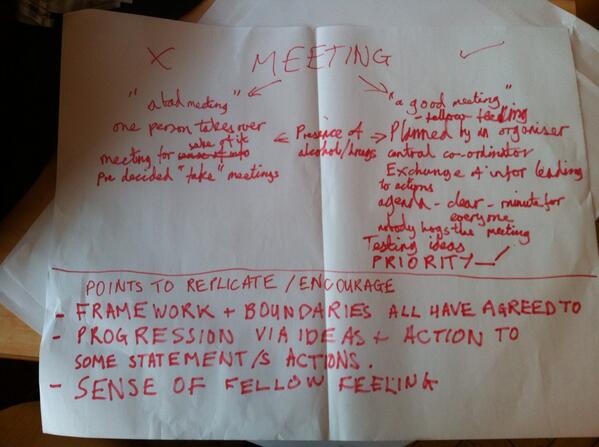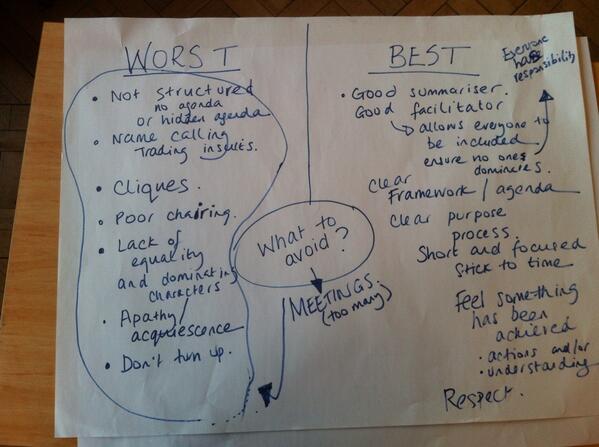So the Co-operative Group Chief Executive has offered his resignation as he considers the organisation to be ‘ungovernable’. His proposed solution, if Robert Peston’s report is accurate, is a more PLC-style Board composed of more executives and fewer elected members. Clearly if such a move is adopted it would threaten the co-operative way the group is managed, but if that’s what Members want, that’s fine. The key issue here is that Members (such as myself) should be the ones to make that decision, not the Chief Executive. It’s not a Chief Executive decision, neither is it a Board decision. A decision of such magnitude, affecting the very nature of governance and strategic control of the enterprise, should be a member decision. Co-operative Boards are elected to oversee strategic management of the business. Co-operative managers are responsible for operational management to achieve the strategic direction agreed by the Board.
But crucially, in a co-operative, on major issues such as structure, election of Directors and levels of Member profit distribution, Members should have the final say. Members own the business, they are the sovereign body, and the Board should seek their views. The fact that the most consultative process the Co-operative Group has carried out in decades – #haveyoursay – was targeted at the general public and not members was a worry. If people want a say they can join. Membership is open and voluntary!
Far from democratic member control being a weakness, as is being reported, it is the strength of the co-operative model. If anything, it is the failure of the Co-operative Group to use its democratic structure to listen to its members that is losing its advantage and causing the current problems. If member economic participation was taken more seriously, we might not be facing the reported financial crisis that the Group is facing.
The Group’s Chief Executive is reported as claiming the business is ‘ungovernable’. Yes, it is ungovernable by an individual, because it is democratically controlled – in much the same way a democratic country is ungovernable by dictators! But that does not make it ‘unmanageable’ which should be the Chief Executive’s concern. He is a servant of the Board not their master and should manage according to their agenda not set the agenda. Board scrutiny of strategic governance decisions is a strength.
One of the main accusations being levelled at the Co-operative Group at the moment is that its Board requires particular expertise in its members. This is only true if your enterprise adopts a ‘management’ style of governance. If you have a ‘representative’ style of governance (adopted by most co-operatives practising the Co-operative Principle of democratic member control) it does not follow that your Board cannot make good decisions. A key duty – and good practice – for Directors of co-operatives, whatever the legal structure, is to act within the bounds of their own skills and experience. When they fail to have significant experience they should take specialist advice and act upon it. You bring the specialists in when needed – you don’t hand the Board over to them! On this, the largest co-operative in the land could learn from the governance good practice used by many of the smallest.
Another accusation that is levelled at the Co-operative Group is that, because the Board is democratically elected, executives cannot get on with their job of managing the business. I believe this is a load of rot that is being levelled by people opposed to democratic member governance or who have personal grudges to bear. If it is the case then the answer is to review the management systems, job roles and responsibilities of executives – not to change the nature of the governing body. If this were a mainstream corporation they would call in management consultants. This is an option open to the Co-operative Group. Again, the largest co-operative in the land can learn from some of the smallest. From small consumer co-operatives running a village shop or pub to the Phone Co-op or other co-operative retailers, the division between strategic governance, strategic management and operational management is made clear and executives have clearly defined job roles, responsibilities and decision making powers that enable them to get on with running the business in line with the wishes of the Board, who represent the interests of the Member owners. Co-operantics, along with many of our co-operative development colleagues who deliver support to smaller co-operatives funded by the Group’s own Co-operative Enterprise Hub, possess the skills and understanding in this area that many corporate consultants do not!
We really hope that the Co-operative Group can resolve this latest crisis, and will not look to the City for a solution, where consultants do not understand democratically-controlled member businesses and will advocate a shift towards their comfort zone of shareholder interests over-riding those of consumers, workers and communities. Instead we hope it will look to its members and its sisters and brothers in the wider movement who are all willing and ready to contribute to a solution. The co-operative model challenges those city assumptions – and provides a more sustainable business model – let’s not throw the baby out with the bathwater!


